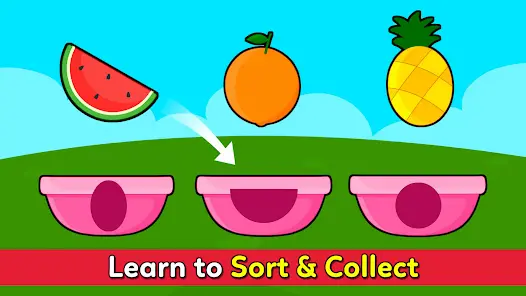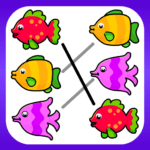Toddler Games for 3 Year Olds+
IDZ Digital Private Limited
Dec 4, 2020
Nov 27, 2023
197.6 MB
1.5.4
Android 4.1+
Description

Overview of Toddler Games for 3 Year Olds
Playing games for toddlers may be both entertaining and educational. These games, which include interactive puzzles, basic memory tests, and artistic pursuits like coloring and building blocks, are intended to enhance cognitive and motor abilities. Toddlers may play while promoting important developmental milestones by participating in these age-appropriate activities.
Main Features of Toddler Games for 3 Year Olds+
- Interactive Puzzles: Toddler games often include puzzles with large, colorful pieces, promoting problem-solving skills and hand-eye coordination as little ones figure out how the pieces fit together.
- Simple Memory Challenges: Memory games help enhance cognitive development by encouraging toddlers to remember patterns, sequences, or matching pairs, fostering memory retention and concentration.
- Creative Activities: Activities like coloring with large crayons or using playdough allow toddlers to express themselves creatively, refining fine motor skills and stimulating imagination.
- Building Blocks: Building games featuring large, easy-to-handle blocks promote spatial awareness and coordination while encouraging imaginative construction and stacking.
- Age-Appropriate Themes: Games often incorporate familiar objects, animals, or characters that resonate with 3-year-olds, making learning more relatable and enjoyable.
- Engaging Sounds and Colors: Vibrant colors and cheerful sounds capture toddlers’ attention, creating an immersive and stimulating environment that keeps them engaged and excited.
- Simple Controls: Toddler games feature uncomplicated controls suitable for little hands, ensuring frustration-free interactions and empowering children to navigate the games independently.
- Positive Reinforcement: Many games incorporate positive feedback, such as encouraging sounds or animations, to reinforce correct actions and boost toddlers’ confidence as they explore and learn.
- Repetition for Reinforcement: Repetition is often used strategically in games to reinforce learning, allowing toddlers to practice and master new skills in a supportive and enjoyable way.
- Safety and Age-Appropriate Content: Toddler games prioritize safety by offering content specifically tailored to the developmental stage of 3-year-olds, ensuring that the activities are suitable and beneficial for their age group.
Some Pros and Cons of Toddler Games for 3 Year Olds+
Pros
- Educational Benefits: Toddler games can aid in the development of essential skills, including cognitive abilities, motor skills, and problem-solving.
- Engagement and Attention: Interactive and visually appealing games can capture and maintain a toddler’s attention, fostering a positive learning environment.
- Independent Play: Many toddler games are designed for easy navigation, allowing children to play independently, promoting a sense of autonomy.
- Creativity Stimulation: Games often include creative activities that encourage imagination and self-expression through coloring, building, and other interactive tasks.
- Positive Reinforcement: Positive feedback in the form of sounds or animations can boost a child’s confidence and motivation as they achieve small milestones.
Cons
- Screen Time Concerns: Excessive screen time, even with educational games, may raise concerns about potential negative impacts on a child’s eyesight, sleep, and overall well-being.
- Limited Physical Activity: While games stimulate mental development, they may not provide the same level of physical activity as traditional play, potentially contributing to sedentary behavior.
How to Use It?
- Download and Install: Go to Apptofounder. Get the game by searching for “Toddler Games for 3 Year Olds+” Install the game on your device.
- Select Age-Appropriate Games: Choose games specifically designed for 3-year-olds to ensure the content aligns with their developmental stage and is both engaging and educational.
- Limit Screen Time: Establish reasonable limits on screen time to balance digital activities with other essential aspects of a child’s development, such as physical play and social interaction.
- Supervise and Participate: While some games are designed for independent play, consider participating with your child to provide guidance, encouragement, and the opportunity for shared experiences.
- Introduce Variety: Include a mix of activities in your child’s routine, combining digital games with traditional play, outdoor activities, and social interactions to promote a well-rounded development.
- Encourage Creativity: Emphasize games that stimulate creativity, such as drawing, building, or imaginative play, to foster self-expression and critical thinking.
- Use Educational Games: Choose games that focus on foundational skills like counting, basic shapes, colors, and simple puzzles to support early learning in a fun and interactive way.
- Incorporate Learning Moments: Take advantage of teachable moments within games to reinforce concepts, encourage problem-solving, and discuss themes that promote language development.
- Ensure Safety and Age-Appropriateness: Verify that games are safe and designed for the specific age group, considering factors such as simplicity of controls and absence of potentially harmful content.
- Rotate Game Selection: Introduce new games periodically to keep the experience fresh and maintain your child’s interest, preventing boredom with a variety of age-appropriate options.
- Encourage Social Interaction: Select games that allow for social interaction, whether through multiplayer options or cooperative activities, to support the development of social skills and teamwork.
- Establish a Routine: Integrate gaming into a balanced daily routine, ensuring that it complements other activities like meals, naps, outdoor play, and family time.
- Monitor Impact: Observe how your child responds to the games and be mindful of any changes in behavior. If needed, adjust the type or duration of gaming activities to suit your child’s individual needs and preferences.
Alternatives
- Educational Toys: Introduce a variety of educational toys that promote learning through tactile experiences, sensory exploration, and imaginative play.
- Storytime: Engage in regular story sessions to foster language development, creativity, and a love for books. To increase comprehension, make questions and have conversations about the narrative.
- Arts and Crafts: Provide art supplies for creative expression. Drawing, painting, and crafting activities stimulate fine motor skills and allow children to showcase their artistic abilities.
- Building Blocks and Puzzles: Use traditional building blocks and puzzles to enhance spatial reasoning, problem-solving, and fine motor skills in a hands-on, non-digital way.
- Cooking Together: Engage your kids in basic baking or culinary tasks. This not only teaches practical skills but also introduces concepts like measurements and following instructions.
Final Words of Toddler Games for 3 Year Olds+
To sum up, toddler games may be useful resources for promoting growth. Age-appropriate games that have been carefully chosen combine instruction and fun while fostering cognitive and motor abilities. But, in order to support a child’s holistic development, it’s important to keep up a well-balanced playtime schedule that includes a variety of activities. Parents may create a stimulating and pleasurable atmosphere that facilitates their toddler’s growth by integrating digital games with conventional play, outdoor exploration, and interactive learning opportunities. During this critical early life era, safety, engagement, and the joy of shared experiences should always come first.
Frequently Asked Questions (FAQs)
What types of skills can toddler games help develop in 3-year-olds?
Toddler games for 3-year-olds are designed to enhance various skills, including cognitive abilities, fine and gross motor skills, problem-solving, creativity, and social interaction.
Are all toddler games suitable for my 3-year-old?
No, not all toddler games are created equal. It’s important to choose age-appropriate games that align with your child’s developmental stage, ensuring they are engaging, safe, and promote learning.
How can I ensure the safety of my child while playing digital games?
Ensure that games are age-appropriate, free from harmful content, and feature simple controls. Additionally, monitor your child’s screen time and encourage a balance with other activities.
Are there any specific recommendations for educational apps for 3-year-olds?
Look for apps with age-appropriate content endorsed by educational experts. Common Sense Media and other parenting resources provide reviews and recommendations for quality educational apps.
How can I monitor the impact of toddler games on my child’s development?
Observe your child’s behavior, engagement, and overall well-being. If you notice positive outcomes, such as increased curiosity and improved skills, and limited negative effects, the games are likely contributing positively to development. Adjust screen time or content if needed.















